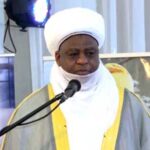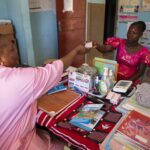Experts under the Severe Acute Malnutrition (SAM) advocacy consortium have called for increased and sustained efforts towards local production of Ready to Use Therapeutic Foods (RUTF) and other nutrition commodities.
They made the call on Monday during the virtual dissemination event of the Advocacy for the Prevention and Treatment of Severe Acute Malnutrition (SAM) project.
- ‘Why tetanus is on the rise among pregnant women’
- Kaduna govt mum as bandits threaten to kill varsity students
Malnutrition is a health condition resulting from eating a diet that is lacking in nutrients. Ready-to-Use Therapeutic Food (RUTF) is used in the treatment of malnutrition in children.
According to a 2017 UNICEF report, an estimated 2.5 million Nigerian children under the age of five suffer from Severe Acute Malnutrition (SAM) every year with nearly 420,000 under-fives dying as a result of this extremely dangerous condition.
The experts said integration of nutrition projects or programmes across the country will yield better results, and also called for strong private sector participation including research into local food practices.
Dr Emmanuel Sokpo of the Network for Health Equity and Development (NHED), said some of the achievements recorded included increase in the political will and funding for nutrition, significant improvement in media coverage for SAM, at the federal and state levels, and harmonization of health nutrition annual plans from development partners and those from state governments, among others.
He said the challenges include lack of ownership of state and national nutrition plans, weak institutional capacity of the relevant ministries, departments and agencies; states’ lack specific nutrition data and state-owned nutrition annual work plans, and COVID-19 pandemic that limited the amount of physical engagement with stakeholders during lockdown, among others.
The Executive Director of International Society of Media in Public Health (ISMPH), Moji Makanjuola, said the project started two and half years ago and was implemented by a consortium of four organisations: Aisha Buhari Foundation (ABF), Network for Health Equity and Development (NHED), International Society of Media in Public Health (ISMPH), and the Civil Society Legislative Advocacy Centre (CiSLAC).
She said it was implemented at the federal level and in five focal states – Bauchi, Gombe, Jigawa, Kano and Katsina. It was implemented over a period of 29 months; November 2018 to March 2021, she said.
She said the consortium has continually reached out to the government, private sector and other stakeholders to invest in nutrition.
The Minister of Health, Dr Osagie Ehanire, said at least 50 per cent of malnutrition cases in Nigeria are due to ignorance in giving the wrong type of foods, adding that increased sensitisation of the populace is key to addressing the problem.
He said the ministry is working towards home grown solutions such as local production of RUTF.

 Join Daily Trust WhatsApp Community For Quick Access To News and Happenings Around You.
Join Daily Trust WhatsApp Community For Quick Access To News and Happenings Around You.


